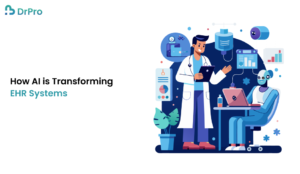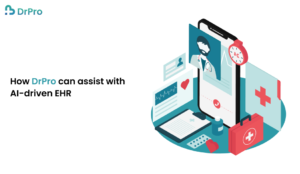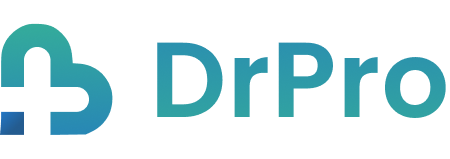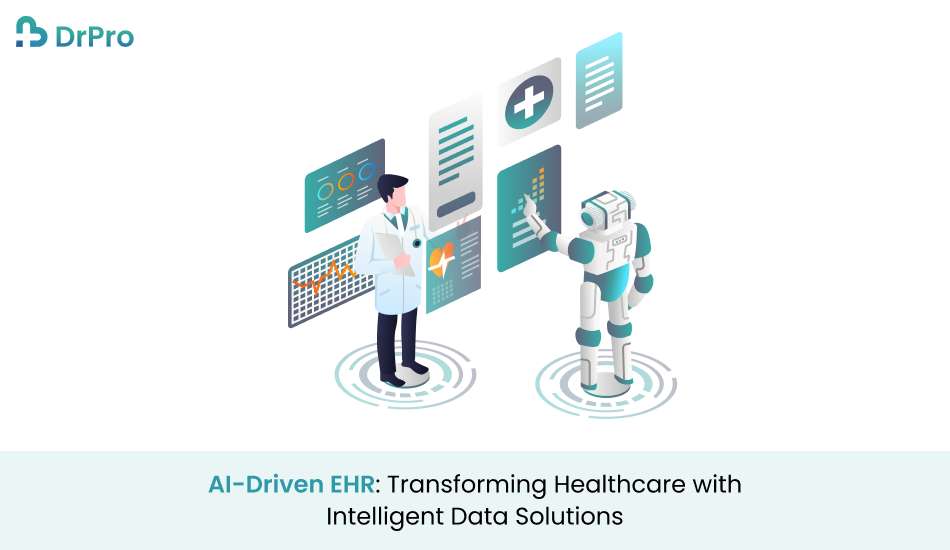Quick Summary
The introduction of AI implemented Electronic Health Records (EHRs) is transforming healthcare by incorporating features such as; machine learning and predictive analysis. These sophisticated technologies improve patient care and clinical working practices by advancing clinical decision support, streamlining administrative work, tailoring patient care plans, and strengthening patient care outcomes and patient care relationships. They also provide early warning for the improvement of patients’ conditions, security for patient’s data, and speed of diagnosis.
Introduction
A combined use of Artificial Intelligence (AI) and Electronic Health Records (EHR) is transforming the field of healthcare by improving the way records are managed. AI-driven EHRs are the next generation of medical informatics, which revolutionizes how doctors and healthcare workers store, process, and apply data. Machine learning, NLP, and predictive analytical tools are incorporated by AI-driven EHR for better decision-making about EHRs and to lessen administrative tasks with favorable results in the patient’s case.
This article discusses how AI is converting Legacy EHR systems into smart information solutions that drive efficiencies, improve adjournment, and provide a glimpse into the future of the healthcare industry.
What is an AI-driven EHR?
An AI-driven EHR system integrates traditional EHR with new Artificial Intelligence technologies while making the record-keeping method more engaging and active. Conventional Electronic Health Record systems record the details or information of patients in electronic form, whereas AI-driven EHR systems utilize formulas to process those details and offer useful information to medical practitioners.
These systems can:
- Automate routine tasks like documentation, coding, and billing.
- Predict patient outcomes using historical data and trends.
- Assist in clinical decision-making by offering evidence-based recommendations.
- Improve diagnostic accuracy through advanced pattern recognition and data analysis.
The application of AI in EHR is useful because it makes operations quicker, makes patient care better, and reduces the time spent on paperwork.
How AI is Transforming EHR Systems

1. Better patient care decision support
Possibly one of the greatest advantages of AI-driven EHR is that the technology is designed to support clinical decisions. Certain artificial intelligence processes work in parallel, sifting through various patient datasets in real-time while providing recommendations concerning patient treatment to healthcare organizations and flagging possible risks.
For instance, it can identify potential drug interaction or contraindication, recommend other treatment options, or warn the doctor about the first signs of dangerous conditions such as sepsis, or congestive heart failure.
A clinical trial published in Lancet Digital Health explained how CDSSs could cut errors in diagnoses by as much as 30% and help patients in the process.
2. Predictive Analytics for Better Patient Outcomes
Through AI-Driven EHR patient past records can be automatically considered and it can have predictive health modeling. It thus makes it easy to detect and treat people with chronic diseases such as diabetes or heart disease, through the application of predictive models. It can also decrease the rates of hospital readmission and actually even enhance patient health status in the long run.
According to a McKinsey & Company report, one of the sets of applications known as predictive analytics could realistically bring approximately $300 billion of annual cost savings to the United States of America’s healthcare system and cut hospitalizations to boot.
3. Automation of Administrative Tasks
Common workflows including, coding, billing, and documentation, consume quite a lot of a healthcare provider’s time. Knowing these tasks, AI-driven EHRs can perform them automatically while healthcare consumers concentrate on patients. The use of NLP means can easily transcribe and analyze the clinical notes to correctly code the bill and even generate the billing information.
AI-associated automation can also help free doctors of paperwork, potentially decreasing the time they spend on documentation by one-fifth, AMA’s study found.
4. Personalized Treatment Plans
Another benefit of applying AI-driven EHR is that it is possible to develop a patient’s therapy based on the use of his/her EHR and genetic characteristics. These details mean that therapy is more efficient and patient compliance is higher to prescribed courses of action.
For example, AI can detect information about the genetic makeup of a cancer patient and get them the right treatment that has more likelihood of success. In the Nature Medicine article, it was established that the assistance of AI increases the level of risk prediction and the subsequent identification of applicable treatments, including the case of oncology.
5. Streamlined Data Entry and Retrieval
However, one of the primary issues with initial AI-driven EHR is that data entry can be very time-consuming. Essentials about AI-incorporated EHRs include voice recognition/NLP and others, as automation of the data entry process. Documentation in these systems includes where the physicians can dictate and the notes are transcribed and used in the Electronic Health Record.
Also, AI-based EHRs provide better default search capabilities and enable users to access information regarding patients faster. It can also sort through data making sure that a physician is in possession of the relevant information whenever he or she needs it.
6. Improved Data Security and Privacy
AI-driven EHR developed using AI technologies provides features that can greatly improve the level of security of the records. Machine learning algorithms can be programmed to detect Activity/fraudulent patterns indicating Security threats in real time, thus aiding Healthcare providers in cases of Breaches. It also ensures that rules like HIPAA are met by automating security measures and often checking who had access to which data.
This is why when applying AI in security, a recent report by Accenture established that the use of AI in security systems can work extremely well in the healthcare industry to protect the patients’ data from being breached by half.
7. Real-Time Population Health Management
AI-driven EHR can actually develop population health by accumulating and analyzing vital data from various patient populations. Health caregivers can notice the patterns and therefore prevent, track, and coordinate measures that are meant to fight various diseases. Healthcare professionals can, therefore, use AI-driven analytics to select resources effectively and counteract diseases more effectively.
In the light of current COVID-19 outbreak, AI-driven EHR systems demonstrated significant potential in monitoring infection rates, predicting further spikes, and managing the distribution of vaccines. Real-time analysis of big data proved to be crucial in the ability of public health officials to make sound decisions fast.
8. Faster and More Accurate Diagnostics
Fully automated AI-driven EHR can also incorporate other diagnostic systems like medical imaging/ICU and laboratory results for quicker and more accurate diagnosis. For instance, AI algorithms can interpret radiology images in search of disease symptoms, and often we see that the AI algorithms identify an abnormality that the human eye is unable to detect.
This integration can help to diagnose diseases such as cancer at an early stage while also increasing the difference in favor of the patient.
A study in The Journal of the American College of Radiology has on the same revealed that AI-based algorithms can increase the diagnostic accuracy of radiologists by as much as 15 percent, especially for the preliminary stages of diseases.
9. Improved Patient-Provider Communication
AI-driven EHR provides alternatives to the patient-provider face-to-face communication about health information. Patients can be asked questions, reminded to schedule an appointment, or notified of a time to take a particular medicine or drug through an AI-driven chatbot.
Furthermore, patient-centered applications that are based on AI can provide relevant recommendations on the patient’s condition resulting in a better understanding of their disease processes and treatments. This enhanced communication keeps patients compliant and satisfied with the services offered to them.
10. Continuous Learning and Adaptation
In a nutshell, machine learning AI-driven EHR does not remain passive; it learns from the new data fed into the system. These algorithms are dynamic and the ability to analyze patients’ data becomes improved and more efficient as time goes on. It means consistent development of the AI-driven EHR system hence it is capable of providing a higher level of assisting health care providers.
While these systems continue to gather more and more information regarding patients and the healthcare system, they progress in the efficiency of early risk assessment, in the ability to anticipate outcomes, and in individualized medicine—thus the healthcare system is becoming a self-learning environment.
How DrPro can assist with AI-driven EHR

DrPro also delivers the best value that utilizes artificial intelligence to revolutionize healthcare by making AI-driven EHR systems all-inclusive and effective. Using elements such as predictive analytics, native documentation, and advanced CDS, DrPro enables healthcare professionals to perform at a higher level with less clinician time wasted on paperwork.
DrPro AI-driven EHR as a platform considers the interoperability of AI given that healthcare providers require easy access to work with AI tools. It is also highly configurable, to get the platform to look and function how the healthcare organization wants it to. With AI capability, integrated into its EHR, DrPro enables your practice to remain relevant in the modern, ever-tech-savvy focused healthcare environment.
Conclusion
AI-driven EHRs are today at the forefront of futuristic healthcare because they offer smart data solutions that can drive healthcare delivery and take out non-value-added work. Although there are certain limitations to current AI-driven EHR, those healthcare providers embracing AI in the future would be in good shape in addressing the complexity of the modern healthcare delivery process, from individual patient-centered care to evidence-based treatments, risk evaluation, prediction, and many others.
Electronic health records are currently one of the pillars of advanced technologies, which will be the mainstay of the advanced healthcare system in the future. When applied to EHR systems, AI can help healthcare providers improve their decisions, decrease expenses, and in turn – help more of their patients.
With ProjectTree and DrPro working together, clients benefit from an integrated solution that bridges the gap between project management and medical practice
FAQs
Q1. What is an AI-driven EHR?
An AI-driven EHR combines traditional electronic health records with artificial intelligence to enhance data management, decision support, and patient care. It uses machine learning, natural language processing, and predictive analytics to analyze and process healthcare data.
Q2. How does AI improve clinical decision-making?
AI analyzes vast amounts of patient data to provide evidence-based recommendations and flag potential risks, helping healthcare providers make more informed decisions and reducing diagnostic errors.
Q3. Can AI-driven EHRs reduce administrative tasks?
Yes, AI-driven EHRs automate administrative tasks like documentation, coding, and billing, reducing the time healthcare providers spend on these tasks and improving operational efficiency.
Q4. What role does AI play in personalized medicine?
AI-driven EHRs can analyze patient data to create personalized treatment plans, improving the effectiveness of treatments and patient adherence.
Q5. How does AI enhance data security in EHR systems?
AI-driven EHRs use machine learning algorithms to detect potential security threats in real-time, reducing the risk of data breaches and ensuring compliance with data privacy regulations.


